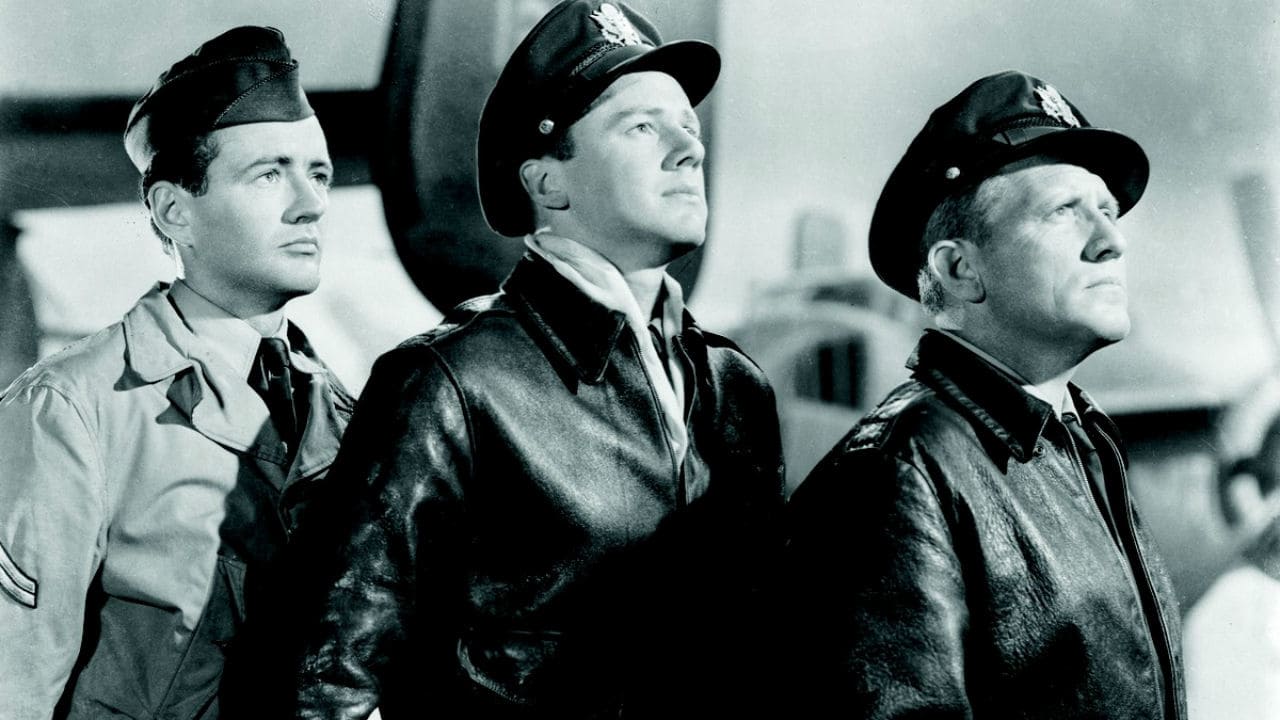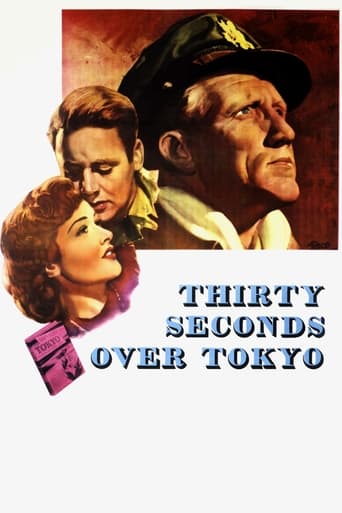

During World War II (before I was born) my father was in the army and served in the campaign that went up through the boot of Italy and then over into Berlin in the closing weeks of the war. After the war he became a civilian, but then in 1952 reenlisted, but this time in the Air Force, where he remained until around 1968. Whenever he would come home on leave I would be stuck watching every old war movie on television, and going to any new war movie at the movie house. Perhaps as a result of over-exposure to war movies, it's a rare war movie that holds my interest. This is one of those rare movies.First, it's a good story...based on the historical first raid on Tokyo during WWII.More important to the movie are strong performances. This was the film that really made Van Johnson. And, indeed, it may be his best performance on film. Ironically, makeup covers up the scars from his terrible real-life auto accident in the first half of the movie. But after the plane crash is this film, they allowed the terrible scars on his forehead show very clearly Spencer Tracy plays Jimmy Doolittle, although he is in a supporting role here...supporting also in the sense of bringing one really big name to the production, thereby increasing box office. I usually think of Don DeFore as being pleasant though shallow, but he does very nicely here as part of the plane's crew who becomes severely injured. Phyllis Thaxter sweetly plays Van Johnson's wife. There's a young Robert Mitchum here in a small supporting role. And Benson Fong is very good as the young Chinese doctor.I'll tell you how good this film is...there were a couple of scenes that brought tears to my eyes, and I don't think that has ever happened to me with a war film.That's not to say it's a perfect movie. The scenes on the beach after the plane crash are poorly acted, perhaps ever hokey. But other than that, it's a great film.
... View MoreTHIRTY SECONDS OVER TOKYO has men training for a dangerous mission, led by Col. Doolittle (Spencer Tracy) who leads them into an adventure that begins with fully loaded bombers making their ascent into the wild blue yonder aboard Naval aircraft carriers. The cooperative team efforts between the Navy and the Air Force is demonstrated throughout and the result is a film that looks almost documentary in its approach to the subject matter.But you have to get beyond some sentimental interludes for romance and that's where the story weakens somewhat, despite the sincerity of the moments depicted between VAN JOHNSON (as Lt. Dawson) and his loving wife (PHYLLIS THAXTER). Nevertheless, by the time the story reaches its powerful conclusion, you'll be rooting for the reunion of the husband (a wounded war hero who has lost one leg) and his wife who is expecting a baby.Sterling performances help put the movie over. Never for a moment is the acting less than exceptional--and that includes VAN JOHNSON in the leading role, ably supported by SPENCER TRACY, ROBERT WALKER, ROBERT MITCHUM, DON DeFORE, SCOTT McKAY, STEPHEN McNALLY (billed as Horace McNally) and, in an unbilled small role, BILL WILLIAMS. All give natural portrayals that are as compelling as the events of the bombing over Tokyo, the crash landing in China and the many events that follow. Relationships between Americans and the Chinese make for the most touching elements in the crash scene and the hospitalization.A fine tribute to the war effort, it's among the best of the service films produced by any of the major studios during WWII.
... View MoreI was on the Air Force ROTC faculty at Cal Berkeley 1966 - 70 (the quiet years). In 1967 the Doolittle Raiders were having their 25th reunion at nearby Alameda Naval Air Station. Jimmy Doolittle was a Cal grad, so we invited him to present the "Doolittle Award" which we gave to our outstanding AFROTC cadet. He accepted on one condition - no prior publicity that he was to present the award. That was both a reflection of his humble nature and the realization that if the Cal hippies knew he was to appear they would turn out in droves to protest. Our offices were in the basement of Harmon Gym. Jimmy was very nostalgic about that location. While at Cal he was a wrestler and worked out in the gym. Jimmy shared a very humorous story with us. When the war broke out Jimmy was not young. He got a telegram from a compatriot about his age asking him how they could contribute to the war effort. At the time Jummy was training for the top secret operation. He sent a telegram back telling his buddy something like: "we have to leave the war to the younger generation." Shortly after the Doolittle raid, he got another telegram from his buddy. It read simply: "You SOB." Jimmy laughed as he told the story. For the reunion he invited me and one of our cadets to join the ceremony. That involved boarding the aircraft carrier USS Oriskany, sailing out under the Bay Bridges and watching aircraft doing touch and go landings. Jimmay and his raiders were on board. One of the biggest disappointments of my life was that while in our office I had my picture taken next to Jimmy. Somehow the film was lost and I never got a copy for my scrapbook. Jimmy Doolittle was a genuine Greatest Generation hero. Courageous, humble, and patriotic. Those who were not around during World War II days cannot possibly imagine the unity that prevailed in our country. This movie captures much of that spirit. I highly recommend it, but wish they would make a movie of Jimmy's life.
... View MoreOut of the five widely panned comments on this movie, the one quoted in my summary posted by Ariellion 8-27-05 does not deserve the 100% disapproval it has gotten since, especially if any of the naysayers were familiar with 1940s pop music.The theme to the Rodgers-Hammerstein musical OKLAHOMA! is used as a motif at least four times in this film, and it is not so much disguised as slightly adapted to be a self-contained musical expression of Americana, joining songs sung by airmen in the movie ("The Yellow Rose of Texas" and "The Eyes of Texas Are upon You"), the Star-Spangled Banner sung in Chinese by the Chinese children's chorus, and instrumental versions of "Anchors Aweigh!" and the Air Force Hymn.Seeing as how Richard Rodgers was commissioned to write the soundtrack for the so-called propaganda documentary VICTORY AT SEA (a score which still sells separately as a tone poem in the tradition of Richard Strauss' work or Gustav Holst's "The Planets"), it is more likely that the composer suggested the OKLAHOMA! motif be included in this score a year later, than that TOKYO composer Herbert Stothart tried to pull off one of the clumsiest musical plagiarisms in history.
... View More